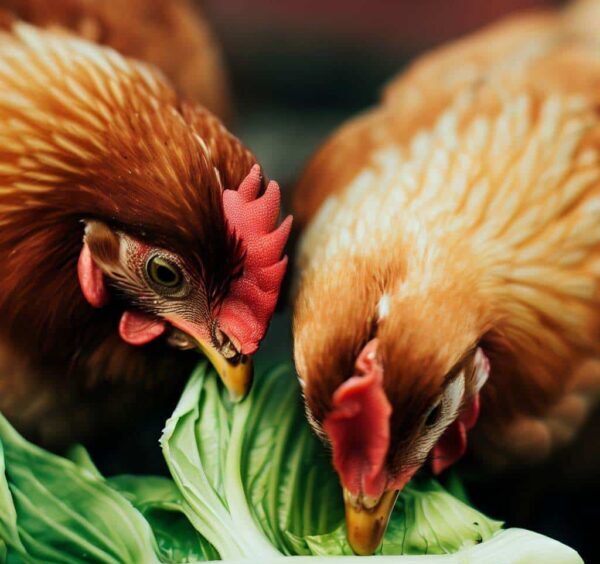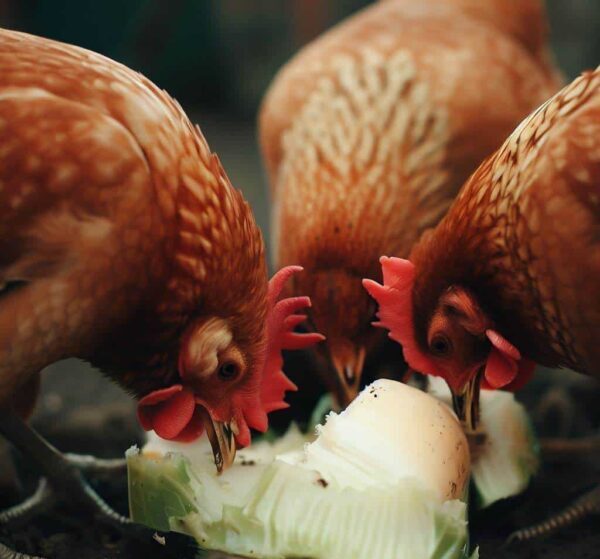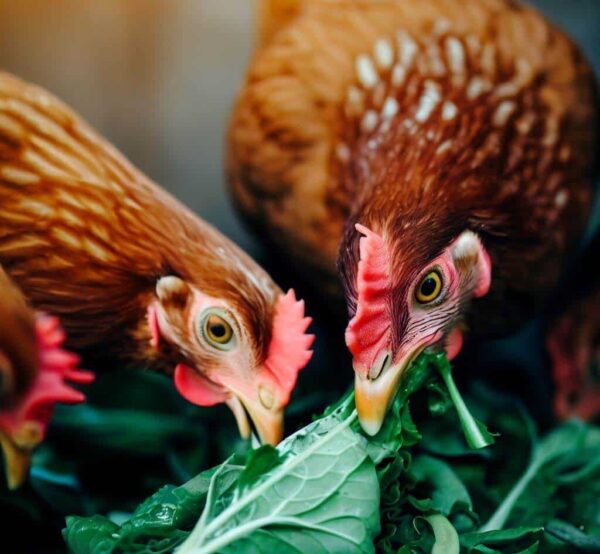Can Chickens Eat Bok Choy? Yes, But How Much?

Key Takeaways
- Chickens can eat bok choy as it’s very rich in nutritional value. But remember to only give it as a treat to prevent any serious issues.
- Bok Choy Benefits: Nutrient-rich bok choy is good for chickens’ heart health, bone strength, and digestion.
- Antioxidants: Bok Choy’s antioxidants reduce cancer risk and bolster the immune system in chickens.
- Drawbacks: Watch for excessive oxalic acid, high nitrate levels, and glucosinolates that can harm chickens.
- Feeding Guidelines: Wash, cook, and offer bok choy occasionally (up to 10% of diet) for safe consumption.
- Diverse Diet: Mix bok choy with other veggies and fruits to create a balanced diet.
- Final Word: Bok choy is a nutritious treat when properly incorporated into chickens’ diet.
Introduction
A balanced and nutritious eating regimen is crucial for raising chickens’ well-being. Whole grains and seeds are staples in a chicken’s diet, and introducing fresh vegetables can also be beneficial.
One such vegetable that often raises questions among chicken owners is bok choy. This text will dive into the query, “Can chickens eat bok choy?” and explore the nutritional content, benefits, potential drawbacks, and first-rate practices for serving this leafy green on your chickens.
Topics Covered In This Article
What is Bok Choy?

Bok Choy, scientifically known as Brassica rapa chinensis, is a member of the Chinese cabbage family. It’s characterized by its crisp texture and sweet, mild flavor.
Bok choy belongs to the Brassicaceae family, which also includes a variety of other vegetables like Turnips, Brown mustard, Broccoli, Brussels sprouts, Cabbage, and Cauliflower.
This family of vegetables is well-regarded for its nutritional richness and health benefits.
Nutritional Content of Bok Choy
According to Food Data Central, A 100-gram serving of Bok Choy contains (1)
| Nutrient | Amount | Unit |
| Water | 95.3 | grams |
| Energy | 13 | kcal |
| Protein | 1.5 | gram |
| Carbohydrates | 2.18 | grams |
| Fiber, total dietary | 1 | gram |
| Calcium, Ca | 105 | milligrams |
| Iron, Fe | 0.8 | milligram |
| Magnesium, Mg | 19 | milligrams |
| Phosphorus, P | 37 | milligrams |
| Potassium, K | 252 | milligrams |
| Manganese, Mn | 0.159 | milligram |
| Folate, total | 66 | µg |
| Folate, DFE | 66 | µg |
| Choline, total | 6.4 | mg |
Bok choy has good nutritional value, offering many essential minerals such as magnesium, potassium, iron, calcium that can contribute to a chicken’s overall health.
Bok choy also contains phytonutrients linked to potential cancer-fighting properties such as vitamin C, E, beta-carotene, folate, and selenium, making it a valuable addition to chickens’ diet.
Benefits of Bok Choy for Chickens
When it comes to feeding bok choy to chickens, there are several benefits such as:
Heart health, Immune system, and cancer reduction
Bok choy is packed with beta-carotene and lutein, which act as antioxidants. These antioxidants are known to support heart health, reduce the risk of cancer, and enhance the immune system in chickens according to PubMed Central. (2)
Supports Bone Health
It’s rich in magnesium (3), potassium (4), iron (5), calcium (6), folate (7), and vitamins A, C, and K (8) according to PubMed Central, Science Direct, and The Poultry Site.
These nutrients are crucial in maintaining proper bodily functions, boosting the immune system, and promoting bone health.
Aids in Digestion
Bok choy is high in dietary fiber, aids digestion, and contains essential minerals such as iron, calcium, magnesium, and folate, all contributing to overall well-being according to PubMed Central. (9)
Potential Drawbacks of Bok Choy for Chickens
While bok choy offers numerous benefits, there are potential drawbacks to be aware of.
High-Levels Of Oxalic Acid
The leaves and stems of bok choy contain high levels of oxalic acid. While small amounts of oxalic acid are not harmful, excessive consumption over time can lead to kidney damage in chickens according to Dergipark Akademik. (10)
Nitrate Content (In Some Varieties)
Certain varieties of bok choy may contain nitrate levels that exceed recommended limits, which can cause a decrease in the growth rate of broiler chickens according to PubMed Central. (11)
Glucosinolates
Large quantities of glucosinolates found in bok choy can be toxic to humans and animals, particularly those already seriously ill.
A study by Science Direct has found that poultry diets high in glucosinolates have been shown to increase mortality and lower egg production and weight. (12)
Myrosinates
Myrosinates is a compound that is present in bok choy and can be harmful to chicken egg production. According to PubMed Central, the addition of myrosinase in conjunction with high glucosinolates has led to an increased reduction in egg production for chickens.
How to Serve Bok Choy to Chickens
Suppose you decide to feed your chickens bok choy. In that case, it’s important to follow some guidelines to ensure their safety and well-being:
- Wash First: Always thoroughly wash the bok choy to remove dirt or pesticides.
- Cut And Cook: Chop the bok choy into small pieces and lightly cook it to make it easier for chickens to digest.
- Hanging it Up: Hang the bok choy to give chickens an engaging and stimulating way to peck at it.
- As a Treat: Use bok choy as an occasional treat rather than a staple in their diet.
- 10% of Their Diet: Bok choy should make up at most 10% of their overall diet to maintain a balanced intake of nutrients.
- Fruit and Vegetable Mix: Combine bok choy with other safe vegetables and fruits to create a varied diet for your chickens.
Other Greens That Are Beneficial to Chickens
The following are some of the other greens that can be beneficial to chickens
- Spinach
- Mustard Greens
- Collard Greens
- Lettuce
- Kale
- Turnip Greens
- Chard
Can Chickens Eat Bok Choy: Final Words
In conclusion, bok choy can be a valuable addition to your chickens’ diet when offered in moderation and following proper guidelines.
Its rich nutrient content, antioxidants, and potential health benefits make it a nutritious treat for your feathered friends.
By understanding the nutritional components and practicing safe feeding practices, you can enhance the well-being of your chickens and provide them with a diverse and enjoyable diet.
FAQs
Chickens should avoid eating vegetables from the nightshade family, such as tomatoes, potatoes, eggplants, and any spoiled or moldy produce.
Chickens can enjoy a variety of greens, including lettuce, spinach, kale, and dandelion greens.
Avoid giving chickens highly processed foods, sugary treats, salty snacks, and foods with high fat content.
Foods rich in protein, such as legumes and mealworms, can increase chicken egg production.
Yes, Cabbage is safe and nutritious for chickens to eat in moderation. It can be a great source of vitamins and minerals.
Sources
VeryWell Animals uses high-quality sources, such as scientifically reviewed studies in it's articles. Discover our unique approach to fact-checking and ensuring our content remains accurate and trustworthy.
- Nutritional Content of Bok Choy – Food Data Central
- Antioxidants in Poultry Nutrition and Reproduction: An Update – National Library Of Medicine
- Effects of increasing supplementation of magnesium in diets on productive performance and eggshell quality of aged laying hens – Pub Med Central
- Studies on the Potassium Requirement of the Laying Hen – Science Direct
- Effects of Dietary Iron Level on Growth Performance, Immune Organ Indices and Meat Quality in Chinese Yellow Broilers – Pub Med Central
- The effects of dietary calcium and phosphorus level, and feed form during rearing on growth performance, bone traits and egg production in brown egg-type pullets from 0 to 32 weeks of age – Pub Med Central
- Folic Acid: Sources, Chemistry, Absorption, Metabolism, Beneficial Effects on Poultry Performance and Health – Pub Med Central
- Importance of Vitamins in Poultry Production – The Poultry Site
- Role Of Dietary Fiber In Poultry Nutrition – Pub Med Central
- The Effect of Adding Oxalic Acid and Phytic Acid to the Diet of Poultry on Calcium Contents of Eggshells – Dergipark AKADEMIK
- Effect of Dietary Sodium Nitrate Consumption on Egg Production, Egg Quality Characteristics and Some Blood Indices in Native Hens of West Azarbaijan Province – Pub Med Central
- Glucosinolates in animal nutrition: A review – Science Direct
Last Updated on 13 October 2023
Waman Nuka is a seasoned wordsmith and a passionate animal enthusiast with decades of experience in the world of animal care. With a deep love for all creatures great and small, Waman’s journey in the realm of animals started as a young boy exploring the lush forests surrounding his childhood home.


